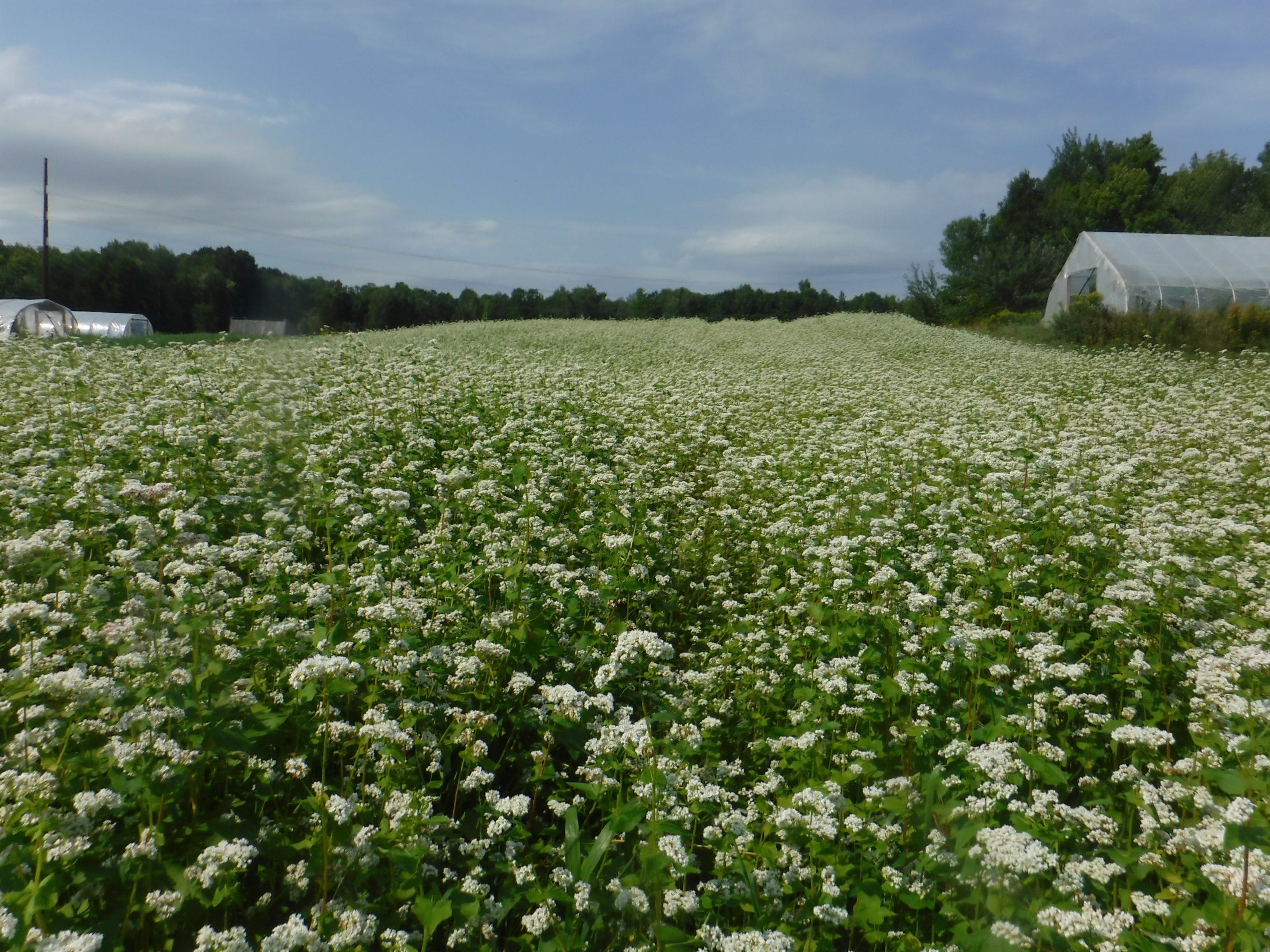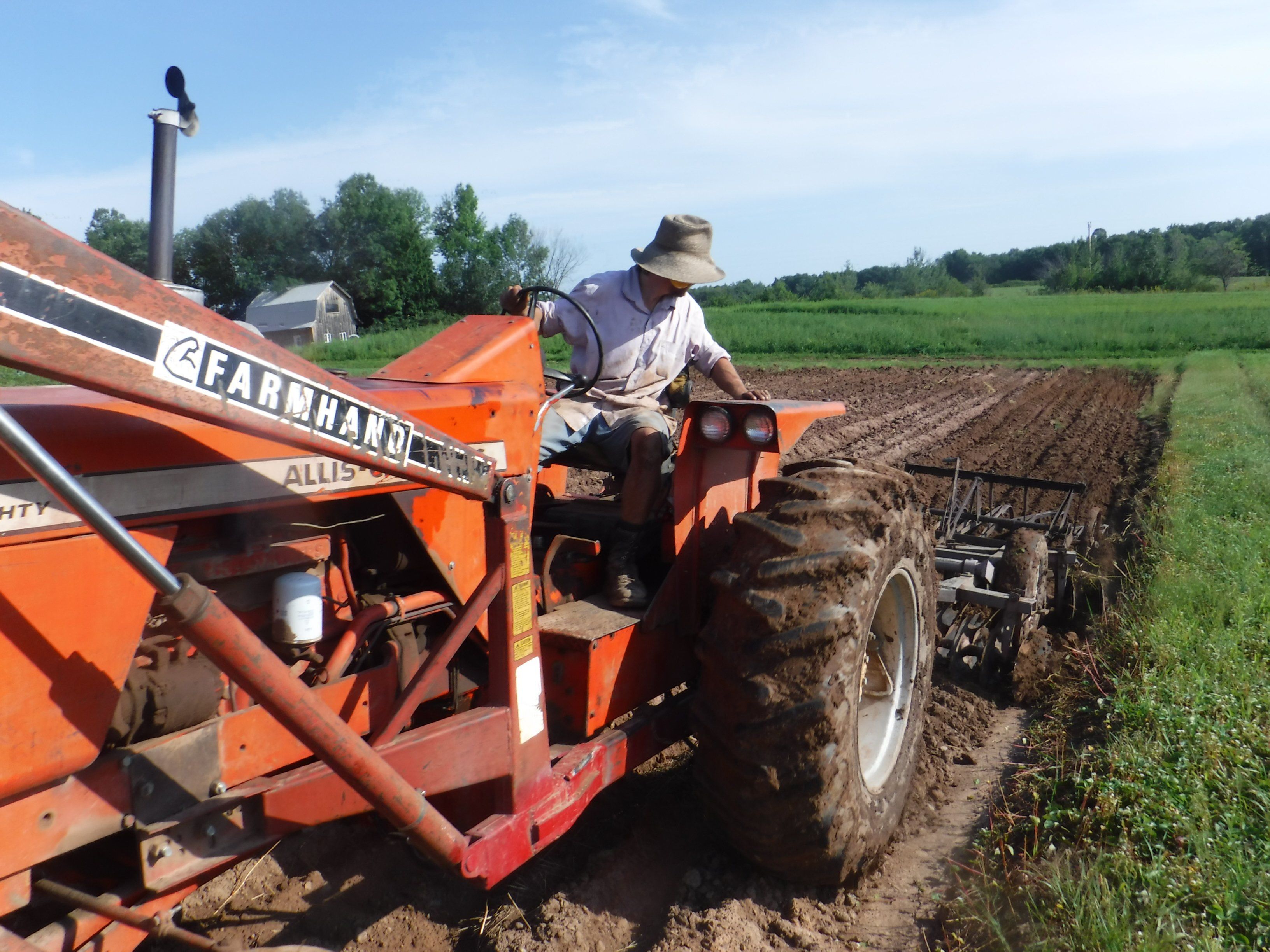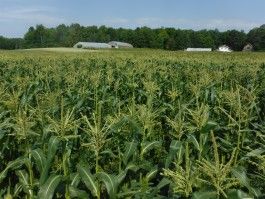A note for those of you who get the Plus Add-on: the Plus items this week will be jam from the Bayfield Apple Company, as well as granola from Starlit Kitchen.
As the summer winds to a close, the pace has picked up substantially here at the farm. During the day, we are still basically picking all day every day. After dinner, once farmers Eric and Ryan have left, I head back out on the tractor and work until nightfall, catching up on field work that needs to happen in preparation for fall cover crop seeding and next year's vegetable plantings. This time of year, we're thinking 2 seasons ahead - getting ready for winter as well as next spring. Like it or not, winter is coming...
Two evenings ago, I mowed down our early green bean planting as well as several fields of cover crops, including the gorgeous stand of buckwheat cover crop featured in last week's newsletter. That buckwheat did a fabulous job of smothering all the weeds, out competing them for sunlight and resources, as well as feeding plenty of pollinators. I was hard pressed to find any weeds growing in that field, that buckwheat was so thick! Mowing it in the evening made sure that all the insects were back at home and not caught by the mower when they were out feeding. Last night, finishing by the light of my headlamp (old tractor lights are always fussy...) I got all of those fields plowed up before the rain comes this weekend. Next week, we'll disc those fields once to smooth out the soil, then seed one more round of cover crops in them. The winter rye and hairy vetch we'll seed - a classic grass/grain (the rye) and nitrogen-fixing legume (the vetch) combo - will put on about 6-8 inches of growth this fall before the ground freezes up. Their vigorously growing roots will hold the soil together to prevent erosion, and then as soon as the snow begins to melt in the spring they will resume growing again. We'll let them grow until they are a few feet tall and then mow 'em down and get those fields ready for winter squash and other veggies. Rye is known for it's ability to put deep, deep roots into the soil. Once terminated, those roots "inject" lots of organic matter deep into the soil, and provide a coral reef-like structure for soil micro-organisms to thrive in. Through intentional organic management we can use agriculture to BUILD soil, instead of deplete the soil. When put into practice, biology is pretty cool.
Since we have been using regenerative organic practices on our land, we've noticed a host of surprising responses. Native wild flowers like this blue vervain have begun to re-establish among our apple trees. We see lady bugs frequently - lady bugs are predatory bugs that prey on the "bad bugs" that can damage our veggie crops. Just a few days ago, we found a string of delicate lacewing eggs, another beneficial predatory insect, on the underside of a broccoli leaf. Some farmers actively plant native species to feed pollinators and buy ladybug and lacewings to release on their farms for pest control - ours just showed up because we have been building soil and the ecological systems to support them. While farms have a (sometimes well deserved!) reputation for being "at odds" with Mother Nature, little discoveries like these help reassure me that we are indeed on the right path.
Always looking for ways to keep soil covered and build ecology, this year we tried broadcasting clover seed in our final planting of sweet corn once it was too tall to cultivate any more. It was a total gamble, but as you can see in the picture above, the baby clover has taken root and is doing quite well under that corn. Once the corn is harvested, we will mow the stalks down and the field will instantly be a stand of clover for the winter, fixing nitrogen fertilizer from the air (for free!) This trial was so successful we plan to implement the clover underseeding of sweet corn on all of our corn plantings next season. That way we get BOTH a cash crop (the corn) and a cover crop (the clover) in the same field in the same year, feeding both people and the soil - a win-win!
We've been getting up close and personal with that soil while digging those big beautiful carrots you have been enjoying, and I thought I would share a picture of our barrel washer with you. Cleaning all those carrots can be pretty labor intensive by hand, but thankfully it's pretty quick work in our barrel washer. The washer is a long tub that slowly turns and rolls the carrots over while water jets spray the produce inside. We even have a pressure washer rigged up at the end to give them a good shining up. Dirt gets rinsed off and drains out with the wash water, resulting in nice clean root crops. It's a pretty crucial piece of equipment on our farm, and we use it for all kinds of roots like carrots, beets, and potatoes, especially when we are racing the cold later in the fall to put crops away in the root cellar for winter. Gone are the days of scrubbing carrots by hand frantically while the first snows of fall sift down from the sky, and my fingers are SO glad!
Enjoy the weekend, and we'll catch up again next week. Here's to the bounty of summer!
In community,
Farmer Chris
Great Oak Farm









